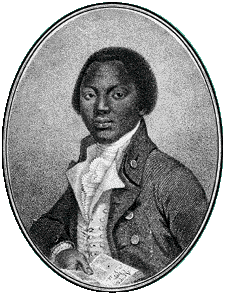Wednesday, June 14, 2006
About Olaudah Equiano

About Olaudah Equiano
Olaudah Equiano was born in Essaka, an Igbo village in the country now known as Nigeria in the year 1745. At age 11, he was kidnapped by Aro people and sold into slavery. He survived the inhumane Middle Passage to Barbados in which over 50 % of all African slaves perished. He was finally sold to a planter in Virginia. In 1757, British Naval officer, Michael Henry Pascal bought him as a present to his cousin in London and renamed him Gustavus Vassa. He traveled to Britain and from 1758 – 62, he served the British Navy during the French and Indian War. The promise of freedom made by Pascal was not fulfilled. Equiano was again sold to Robert King in Montserrat.
From 1763 –66, Equiano worked on ships that transported slaves from West Indies to Mainland America. By 1766, he had mastered merchants’ commercial practices and was able to save enough money from his own labor that he paid 40 Pounds Sterling and bought his freedom. As a seaman, he traveled the world from Europe to America and down the Mediterranean. He was involved in the movement to abolish slavery. In 1789, he presented antislavery petition to England’s Queen Charlotte, wife of King George III. He was appointed a commissary officer charged with the resettlement of London’s poor Blacks in Sierra Leone.
Equiano was an intelligent man who was able to learn the language, religion and laws of his enslaver. In 1789, he published “Interesting Narrative of Olaudah Equiano or Gustavus Vassa the African.” It became a popular best seller and made Equiano rich. The book influenced the struggle for the abolition of Slave trade and literally created a new literary genre known as slave narratives. Equiano’s narrative was the first autobiographic book published in English by an African. He was also the first African to write about life in African villages and the horrors of slavery. In 1789, Equiano married an Englishwoman named Susan Cullen. He died in London in 1797 at the age of 52. He was buried in Cambridgeshire, England.
At the time of his death, his narrative has been published in nine different editions.
The struggle, survival, and success of Equiano exemplified the best of Africa in the Diaspora. Naming this prize after Equiano is more of tribute to a man who was the first to tell the African story in English, the first to challenge the oppressive environment Africans in the Diaspora find themselves and the first to overcome the obstacles and make a success of himself. In another way, it is a commitment to the discovery, celebration and preservation of the African experience in the Diaspora.